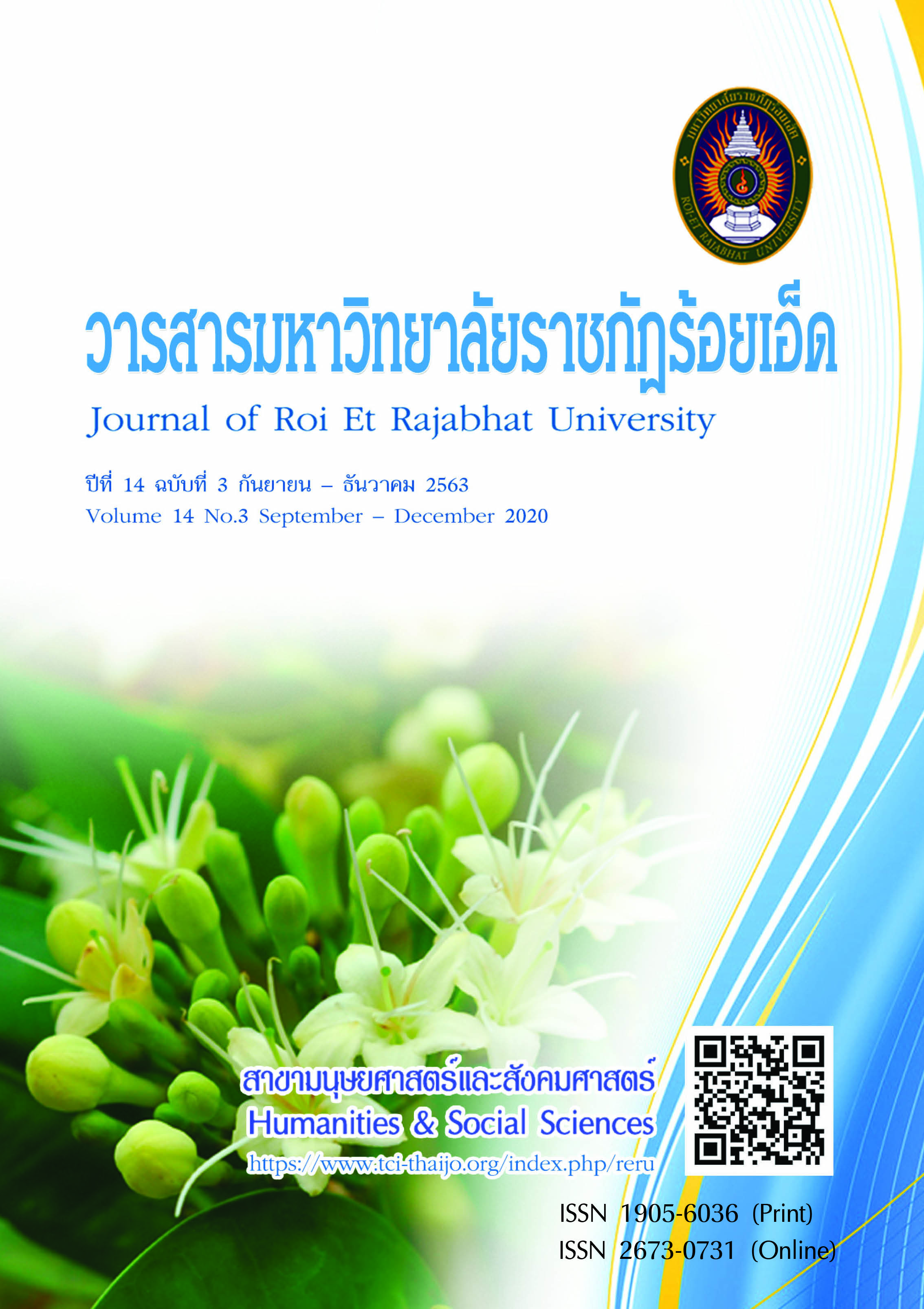The Study Ability Of Scientific Literacy Of Grade 10 Student In The Secondary Education Service Area 26 Mahasarakham Provine
Keywords:
The Secondary Education Service Area 26, Scientific Literacy , Grade 10 StudentAbstract
This research aimed to study ability of scientific literacy of grade 10 student in the secondary education service area 26 . The sample grade 10 studen in the secondary education service area 26 in the first semester at the 2019 academic year from 4 school total 100 students. They were selected by Multistage Stage sampling. The instrument which employed to collect data were the tests of scientific literacy. The data were analyzed by using average, standard deviation and F-test dependent. The finding were as follows the Ability Of Scientific Literacy of Grade 10 Student the level of scientific literacy not differentat the 0.05 significance. the percentage Mean of 2 classrooms was 42.30 percent. and. represented the lower than standard level of OECD’s criterion.
References
กระทรวงศึกษาธิการ. (2560). ตัวชี้วัดและสาระการเรียนรู้แกนกลาง กลุ่มสาระการเรียนรู้ วิทยาศาสตร์ (ฉบับปรับปรุง
พ.ศ. 2560) ตามหลักสูตรแกนกลางการศึกษาขั้นพื้นฐาน พุทธศักราช 2551. กรุงเทพฯ: โรงพิมพ์ชุมนุมสหกรณ์ การเกษตรแห่งประเทศไทย จำกัด.
โครงการ PISA ประเทศไทย สถาบันส่งเสริมการสอนวิทยาศาสตร์และเทคโนโลยี.(2561). ผลการประเมิน PISA 2015 วิทยาศาสตร์ การอ่าน และคณิตศาสตร์ ความเป็นเลิศและความเท่าเทียมทางการศึกษา. กรุงเทพฯ :
บริษัท ซัคเซสพับลิเคชั่น จำกัด.
พุทธริธร บูรณสถิตวงศ์, สุรีย์พร สว่างเมฆ และปราณี นางงาม. (2560). การสำรวจสมรรถนะการอธิบายปรากฏการณ์
ในเชิงวิทยาศาสตร์และสมรรถนะการแปลความหมายข้อมูลและประจักษ์พยานในเชิงวิทยาศาสตร์ตามกรอบ
การประเมินของ PISA 2015 ของนักเรียนชั้นมัธยมศึกษาปี ที่ 4 แห่งหนึ่งในจังหวัดพิษณุโลกนเรศวร.
วารสารกลุ่มมนุษย์ศาสตร์และสังคมศาสตร์, 21(1), 1019–1031.
สถาบันส่งเสริมการสอนวิทยาศาสตร์และเทคโนโลยี. (2551). การรู้เรื่องวิทยาศาสตร์ กรอบการประเมินผลวิทยาศาสตร์
ของ PISA 2006. สืบค้นเมื่อ 6 กุมภาพันธ์ 2562, จาก https://pisathailand.ipst.ac.th/about-pisa/scientific-literacy/
สถาบันส่งเสริมการสอนวิทยาศาสตร์และเทคโนโลยี. (2555). ตัวอย่างข้อสอบการประเมินผลนานาชาติ PISA และ TIMSSวิทยาศาสตร์ (พิมพ์ครั้งที่ 2). กรุงเทพฯ: สถาบันส่งเสริมการสอนวิทยาศาสตร์และเทคโนโลยี (สสวท).
สถาบันส่งเสริมการสอนวิทยาศาสตร์และเทคโนโลยี. (2560). สรุปผลการประเมิน PISA 2015. สืบค้นเมื่อ 6 กุมภาพันธ์ 2562, จาก https://pisathailand.ipst.ac.th/news-8/
สถาบันส่งเสริมการสอนวิทยาศาสตร์และเทคโนโลยี. (2560). ประเด็นหลักและนัยทางการศึกษาจาก PISA 2015:
บทสรุปสำหรับผู้บริหาร. สืบค้นเมื่อ 6 กุมภาพันธ์ 2562, จาก https://pisathailand.ipst.ac.th/isbn- 9786163626011/
สถาบันพัฒนาคุณภาพวิชาการ (พว.). (2561). โครงการพัฒนาครูและบุคลากรทางการศึกษา Thailand 4.0 ที่เน้น Active learning แบบยั่งยืน. สืบค้นเมื่อ 10 กุมภาพันธ์ 2562, จาก http://www.matthayom13.go.th/site/files/new/2561/12/910.pdf
สำนักงานเขตพื้นที่การศึกษามัธยมศึกษา เขต 26. (2562). ข้อมูลพื้นฐานโรงเรียน สังกัด สพม. เขต 26 (มหาสารคาม).
สืบค้นเมื่อ 5 กรกฎาคม 2562, จาก https://data.boppobec.info/emis/school.php?Area_CODE=101726
สำนักงานเลขาธิการสภาการศึกษา. (2560). แผนการศึกษาแห่งชาติ 20 ปีกับการบูรณาการสู่แผนยุทธศาสตร์พัฒนาการศึกษาจังหวัด. สืบค้นเมื่อ 3 มีนาคม 2562, จาก http://www.ubu.ac.th/web/files_up/03f2017041
DeBoer, G. E. (2000). Scientific Literacy: Another Look at Its Historical and Contemporary Meanings and
Its Relationship to Science Education Reform. Journal of Research in Science Teaching, 37(6), 582-601.
Lin, S. and Mintzes, J. (2010). Learning argumentation skills through instruction in socio scientific issues:
The effect of ability level. International Journal of Science and Mathematics Education, 8(6), 993-1017.
OECD. (2013). PISA 2015 Draft science framework. Paris. Paris: OECD. Retrieved February 5, 2019,
from http://www.oecd.org/pisa/ pisaproducts/pisa2015draftframeworks.htm
Sadler, T. and Zeidler, D. L. (2009). Scientific literacy, PISA, and socioscientific discourse: Assessment for progressive aims of science education. Journal of Research in Science Teaching, 46(8), 909-921.
Yuenyong, C. and Narjaikaew, P. (2009). Scientific Literacy and Thailand Science Education. International
Journal of Environmental and Science Education, 4(3), 335–343.
Downloads
Published
How to Cite
Issue
Section
License
บทความที่ได้รับการตีพิมพ์เป็นลิขสิทธิ์ของวารสารมหาวิทยาลัยราชภัฎร้อยเอ็ด
ข้อความที่ปรากฏในบทความแต่ละเรื่องในวารสารวิชาการเล่มนี้เป็นความคิดเห็นส่วนตัวของผู้เขียนแต่ละท่านไม่เกี่ยวข้องกับมหาวิทยาลัยราชภัฎร้อยเอ็ด และคณาจารย์ท่านอื่นๆในมหาวิทยาลัยฯ แต่อย่างใด ความรับผิดชอบองค์ประกอบทั้งหมดของบทความแต่ละเรื่องเป็นของผู้เขียนแต่ละท่าน หากมีความผิดพลาดใดๆ ผู้เขียนแต่ละท่านจะรับผิดชอบบทความของตนเองแต่ผู้เดียว





